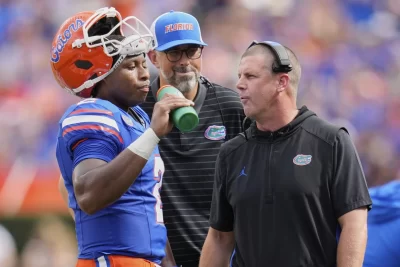
ELMORE, Vt. Julie wants more donations to the food pantry. Kipp is busy knitting a sweater. Shorty is ready to ask: Why is so much being spent on a truck? The coffee, fresh-baked bread and donuts have been laid out. Eighty-seven voters have squeezed into the Elmore Town Hall.
Town Meeting is about to begin. Across the United States, people are disgusted with politics. Many feel powerless and alienated from their representatives at every level — and especially from those in Washington. The tone long ago became nasty, and many feel forced to pick a side and view those on the other side as adversaries.
But in pockets of New England, democracy is done a bit differently. People can still participate directly and in person. One day each year, townsfolk gather to hash out local issues. They talk, listen, debate, vote. And in places like Elmore, once it’s all over, they sit down together for a potluck lunch. Can democracy be civil, friendly, and productive in 2024? In Elmore, Vermont, once a year they meet to talk, listen, debate, vote. And when it’s all over, they sit down together for a potluck lunch. (AP Video: David R. Martin)
Town Meeting is a tradition that, in Vermont, dates back more than 250 years, to before the founding of the republic. But it is under threat. Many people feel they no longer have the time or ability to attend such meetings. Last year, residents of neighboring Morristown voted to switch to a secret ballot system, ending their town meeting tradition.
Not so in Elmore, population 886. Its residents are used to holding tight to traditions. They’ve fought to keep open their post office, their store and their school, the last one-room schoolhouse in the state. Last fall, Elmore residents voted 2-1 in favor of keeping their town meetings.
And so it is at 9 a.m. on the first Tuesday in March, when, atop an elevated stage, moderator Jon Gailmor stands up.
“Good morning, everyone, and welcome to democracy,” he says. “This is the real thing, and we should all be proud that we’re doing this.”
COMMUNITY AND GOVERNMENT, HAND IN HAND
Elmore calls itself the beauty spot of Vermont. The town borders a lake, which in early March is dotted with people ice fishing. Beyond, a mountain rises. At night, steam floats up from sugarhouses, where maple sap is being boiled down into syrup.
The heartbeat of the town is the store. “I’ve always said it’s a live, living, breathing creature. I don’t own it; she owns me,” says Kathy Miller, 63, who bought the store with her husband, Warren, in 1983. People would come in not only to buy milk and pick up the mail but to use the fax machine, find a plumber or just to swap gossip.
In 2020, Warren died. He loved collecting things — advertising signs, beer-tap handles, snowboards. At home, Miller looks through some of his collections and talks about selling stuff. Her sense of loss is profound. Her best friend, the man she worked alongside every day, is gone.
The year he died, COVID-19 restrictions also took a toll on the business, and Miller found she was struggling. Then townsfolk began giving her money in advance. “I had one gentleman give me $5,000 just to keep the store going,” Miller says, choking up.
Miller kept running the store for another 18 months before she was bought out by a community trust, set up to ensure the store remains open. These days, the store is run by Jason Clark. Miller helps out when she’s not serving meals at a food kitchen. And she still collects her bills from P.O. Box 1.
Miller recalls that after joining the state grocers’ association in the 1980s, she testified before Congress about the impact of credit card fees. Back then, she believed that little people could have a voice in national politics. But these days, she says, Washington has gotten away from the basics. Too big, she says. Too messed up. Tilted off its axis.
Her husband served as a Republican representative in the Vermont state legislature, and Miller describes herself as a Republican who hasn’t drunk the Kool-Aid. She notes both Vermont and Elmore have shifted more Democratic over the years. But at Town Meeting, she says, political differences don’t mean a thing.
“There’s no animosity,” she says. “People can talk about things. You shake hands with your neighbor when you leave.”
At Town Meeting, Miller makes a pitch to increase the town’s library funding from $1,000 per year to $3,000, to reflect the increasing patronage and expenses. The townsfolk agree.
A MODERATOR WHO KEEPS THINGS MODERATE
Gailmor, 75, is a singer-songwriter who brings an element of performance to his role as moderator.
“Reappraisals of your homes are going to start in the spring,” he says as he reads through a dry list of announcements. But then, to laughter, he adds: “So spruce ’em up.”or citizens at a music class he teaches at the library Monday, March 4, 2024, in Morristown, Vt. (AP Photo/David Goldman)
He describes himself as an independent voter who has supported both Republicans and Democrats over the years.
The day before the meeting, Gailmor plays his guitar at the library in Morristown. He’s helping a group of senior citizens practice the songs they have written for an upcoming performance. They are supposed to ax two of the eight songs but can’t bring themselves to choose. Instead, they decide, they will perform them all.
The seniors love Gailmor, who says he has somehow aged to become one of therm. They joke about “flatlanders” — people not born in Vermont — and have come up with a song that celebrates the spring thaw: “So break out the booze, we’ve got nothin’ to lose, embracing the ooze, it’s the mud season blues.”
Gailmor first moved to Elmore in 1980 and says he found the town meeting tradition nothing short of miraculous. It wasn’t some politician spouting off but real people taking part. He was so inspired that he even wrote a song about it. He plays it for the seniors.
“Greet the old town folks, hear the gossip and the jokes, dip a donut in a good strong cup of Joe,” Gailmor sings. “Find your favorite chair, plant your buttocks there — we’re getting down to business, don’t you know.”
At town meetings, people sometimes go beyond voting on local issues and decide to take a stand on national issues of the day. At home, Gailmor holds a photograph of his wife, Cathy Murphy, who died two years ago. Captured by an Associated Press photographer, the image shows Murphy at an Elmore Town Meeting in the 1980s, when she was speaking out against nuclear weapons as part of the Nuclear Freeze movement.
“You feel important,” Gailmor says. “You feel like you are being listened to.”
This year, Elmore decides to take a stance on another broader issue by adopting a declaration of inclusion. It states the town will welcome all people regardless of race, religion, sexual orientation or gender identity.
A ‘FORCED CIVILITY’ THAT WORKS
“Forced civility.” Frank Bryan, a retired University of Vermont professor who wrote a book about town meetings, coined that term to describe the way people dealing with disagreements in person are compelled to recognize each other’s common humanity in a way that larger-scale political interactions do not allow.
That doesn’t mean it always goes smoothly. In Gailmor’s decade of moderating, he says one incident stands out. He invoked the rules to stop one man from repeatedly talking on a particular issue. The man seethed, then came up to Gailmor after the meeting to say he felt like chopping his head off. He stormed off and later moved away. The animosity with Gailmor was never resolved.
Miller says she learned her own lesson about small-town politics after once putting up a political sign about school choice in her store. She had one customer who wouldn’t come back and stopped speaking to her, she says. Even with that, though, she is confident about the gentility of the system in which she participates.
Just having voters show up for hours on a weekday morning is challenging. Morristown is one of many Vermont towns to end the tradition of town meetings. Richard Watts, the director of the Center for Research on Vermont at UVM, says people in larger towns tend to feel less sense of connection.




